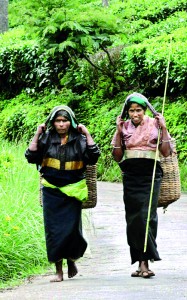Continuing discrimination against Lanka’s tea plantation community
What transpired at a recent Colombo workshop on improving the lives of plantation workers was not only startling but in fact showed that archaic laws still prevail to discriminate against the tea plantation community.
The workshop “Enhancing the Living Standards and Livelihood Opportunities of the Plantation Community” was held last week at the Sri Lanka Foundation and organized by the Pathfinder Foundation.

File picture of tea workers
Speaking on ‘Local Government Services and the Plantation Sector Community’, Rev Fr. Andrew Devadason, Resident Priest, St. Marks Church – Badulla, explained how the plantation community is discriminated and excluded from the country’s mainstream development process entirely, and said, “One point that must be noted and stressed is the historical nature of isolation of the plantation community from the local Government service delivery.”
Digging into the roots of discrimination, apathy and virtual slavery enshrined in the law itself, Fr Davadason said that the Village Committees Ordinance No.26 of 1871, the 1937 amendments, the Village Council law No.06 of 1964 (section 93 (C) specifically excluding the plantation community) and the 1980 District Development Councils Act, etc were all formulated with interconnections to the previous laws and with the same bases of exclusion clauses of the plantation communities.
Exclusion
The 1985 Pradeshiya Sabha (PS) law by itself draws its inspiration from the 1980 DDC and 1964 Village council law. He said that Section 225(2) of No.15 PS law of 1985 states that the sub sections of the no.35, DDC law of 1980 must be taken into account. This means the exclusion of the plantation community becomes legitimized by law.
He said that they were discussing about a community (Indian Tamils) that has been neglected for 150 years in Sri Lanka. He emphasized the importance of a holistic approach towards a sustainable development of this abandoned and neglected tea plantation community, a block of nearly one million people or 5.3 per cent of Sri Lanka’s population, and said “local government services must be understood in that light”.
It is pathetic, he said, that most of these people live and work as labourers throughout the years, generation after generation. Yet, Fr.
Devadason said the country has forgotten that this community has been making a very valuable contribution to the national economy since 1870.
The Central Bank, he said, had indicated that the plantation community is below the national average and below the rural sector in most of the socio/economic indicators. He pointed out that the legal barriers may have contributed to the economic retardation of the tea estate community.
He said PS’s were established for the explicit purpose of facilitating effective people’s participation in local governance and local development, and though the plantation sector has voting rights these people have no opportunity to participate in the management of local affairs which is a denial of equal rights of a citizen. The whole process leads them to unavoidable poverty, he said.
Poverty
At question time, M. Yogarajan, Member of Parliament stated that there appeared to be some manipulation with regard to the data concerning plantation sector poverty level. He said that the 2007 figure showed the poverty level as 32 per cent whereas the figure for 2009 has come down to 9 per cent, but this change is not visible in the plantation section.
M. Vamadevan, Former Secretary, Ministry of Estate Housing Infrastructure and Community Development in his presentation said that there is a marked difference between national, estate and infant mortality rates. The national mortality rate is 8.5 percent while the estate mortality 15.4 per cent. The national infant mortality rate is 4.5 per cent as against 14.3 per cent on estates, showing the sharp differences.
He said housing conditions in the estate sector are deplorable with overcrowding, back to back structures, lack of space and no ventilation. He said that in this sector access to safe water and sanitation is a problem and electricity has not reached everyone. Housing ownership is another issue Ven. Baddegama Samitha Thero, a former MP, speaking on “Plantation Community and Equality” said that while the Americans used Africans as slaves against their will, the British brought Indians and used them as slaves in Sri Lanka in the tea plantation sector and Sri Lanka is one country that still continues this slavery.
Malnutrition
He said that malnutrition among the children in the estate sector is among the highest and the conditions that prevail in this sector are shameful. He said that a foreign friend of his, an expert on eyes and nutrition, along with him visited an estate and his friend examined the eyes of a group of children there to find almost all the children had bad eyesight. He was concerned to find that the eyesight of one of the children was so bad that the child would eventually go blind.
He said that the toilet facilities in that sector are so bad that large numbers of people could be seen queuing up from early morning to take the turn of the single toilet available.
He said, “We speak of democracy and human rights. Lots of speakers say one country, one nation. If things happen the way it is, we cannot keep the country in that position. We need to treat everyone equally instead of treating one person better than the other”.
This Tamil population was brought from India, Ven. Samitha Thero said, but now they are all Sri Lankans. They work here to develop the country. They have left their religion, left their identity.
Bernard Goonetilleke, Chairman, Pathfinder Foundation moderated the workshop and summed up the proceedings.


